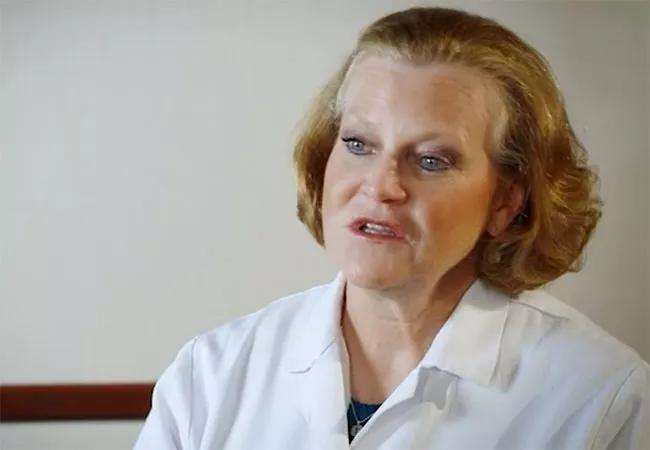A Q&A with Allison Vidimos, RPh, MD

Allison T. Vidimos, RPh, MD, Chair of the Department of Dermatology, specializes in skin cancer, micrographic surgery (Mohs) and laser surgery, and has been among the “Best Doctors in America” every year since 1998. Dr. Vidiomos is Staff Physician in the Section of Micrographic Surgery (Mohs) and Oncology in the Department of Dermatology, and Professor at Cleveland Clinic Lerner College of Medicine. She is also the Program Director of the Procedural Dermatology Fellowship. In this Q&A, Dr. Vidimos shares her journey from pharmacist to dermatologist, and how she keeps her practice stimulating and meaningful.
Advertisement
Cleveland Clinic is a non-profit academic medical center. Advertising on our site helps support our mission. We do not endorse non-Cleveland Clinic products or services. Policy
Halfway through pharmacy school at Purdue University, Allison Vidimos, RPh, MD, participated in hospital rounds with a physician team. Seeing what they were doing, she realized she wanted to do the same.
“I made the decision to finish pharmacy school, took the board exam, and worked two pharmacy jobs while in medical school,” says our Department Chair of Dermatology and an Expert Physician Consultant to the Compounding Committee of the United States Pharmacopoeia. “I do not regret that decision. Pharmacy school was excellent preparation for me to go into medicine.”
She chose her specialty for the variation it offered. “In dermatology, we’re seeing patients from newborn babies to 104 year olds,” Dr. Vidimos says. “As a dermatologist and a dermatologic surgeon, I am treating many different conditions, performing surgical procedures and working with gifted colleagues. I find my practice intellectually stimulating and rewarding.”
Why do you choose to practice at Cleveland Clinic?
I came for my residency in dermatology — one of the best training programs in the country — and stayed on as staff after a two-year Mohs fellowship because I truly enjoy and appreciate my colleagues and the variety of patients we see. The teamwork model helps us to deliver the best care. Our multidisciplinary non-melanoma and melanoma tumor boards are great examples of teamwork. I truly enjoy teaching medical students, residents and fellows and having the opportunity to do clinical research.
Do you have a time-saving tip to share?
The Epic Haiku app on my iPhone has helped me to be more efficient. Because I can access their home and cell numbers on the app, I use it to call many of my skin cancer surgery patients the night of their surgeries to make sure their pain is controlled and that there are no problems with bleeding. I also use it to check biopsy results when away from a computer.
Advertisement
In 2005 you were named the first female department chair at Cleveland Clinic. Any advice on taking a leadership position?
I was hesitant to throw my hat in the ring for the chair position. My girls, Kristen and Katherine, were 10 and 12 years old and my husband, Todd Stultz, DDS, MD, had just recently finished his radiology residency and neuroradiology fellowship. My family, as well as the former Chief of Staff Rob Kay, MD, were very supportive and encouraging.
I had some great mentors, such as Rich Lang, MD, who was the Chairman of Internal Medicine at that time. I took advantage of the leadership offerings at Cleveland Clinic as well as courses offered by our Women’s Professional Staff Association and the American Academy of Dermatology. The coaching, teaching and leadership experiences at Cleveland Clinic have facilitated other opportunities as well. I was elected the first woman president of the American College of Mohs Surgery in 2017-18 for the 50th anniversary meeting, and was appointed as a Director for the American Board of Dermatology in 2018.
What advice you would give to your 20-year-old self?
Don’t ever be afraid to reinvent yourself. My husband Todd and I affectionately call ourselves “retreads.” I switched from working as a pharmacist to a dermatologist. My husband was a dentist when we got married, and at age 32 he decided he wanted to go to medical school. He is able to use his dental background in maxillofacial imaging cases.
Giving back is important to you. What unique ways have you been able to accomplish this throughout your career?
I have been fortunate to participate in 11 medical mission trips to Honduras. Cleveland Clinic cardiologist Russ Raymond, DO, gave me this amazing opportunity 12 years ago. Our team has seen up to 3,2000 patients in six days with eight to nine physicians. It’s a quick pace (no EMR!), but the patients are so in need and so grateful to receive medical care. I have taken some of my residents and my daughters on these yearly trips, and it has been personally and professionally gratifying for all of us.
Advertisement
Advertisement

First-of-its-kind research investigates the viability of standard screening to reduce the burden of late-stage cancer diagnoses

Global R&D efforts expanding first-line and relapse therapy options for patients

Study demonstrates ability to reduce patients’ reliance on phlebotomies to stabilize hematocrit levels

A case study on the value of access to novel therapies through clinical trials

Findings highlight an association between obesity and an increased incidence of moderate-severe disease

Cleveland Clinic Cancer Institute takes multi-faceted approach to increasing clinical trial access 23456

Key learnings from DESTINY trials

Overall survival in patients treated since 2008 is nearly 20% higher than in earlier patients